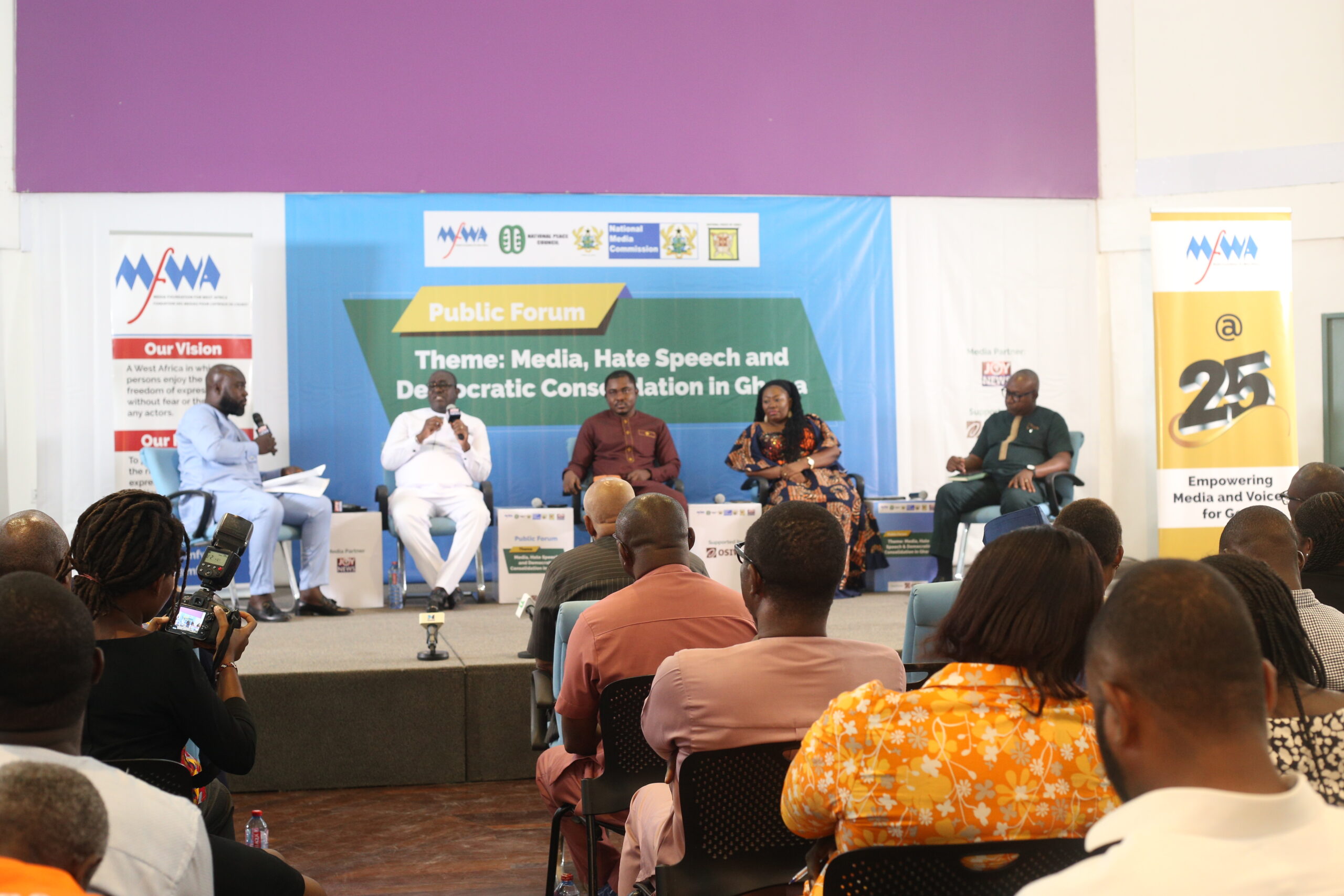Stakeholders at a public forum in Accra have urged the Ghana government to hasten slowly in its bid to criminalize hate speech. After hours of deliberation, it was agreed that hate speech is purveying national discourse and the phenomenon poses a threat to the country’s democracy.
However, the consensus was that legislating it would be a hasty decision that could culminate in negative percussions, especially by way of creating curtailment on the freedom of expression.
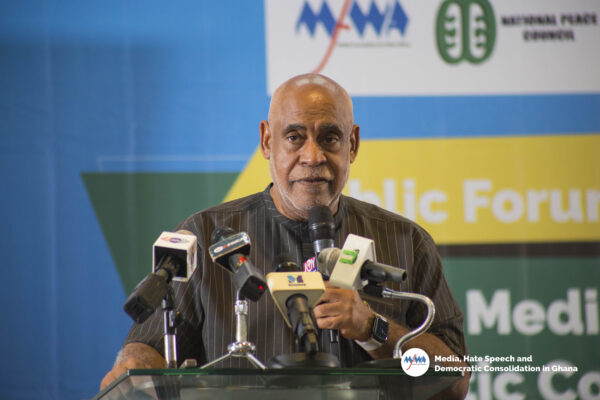
“Freedom of opinion and expression are indeed cornerstones of human rights, and freedoms for a free and democratic society. These freedoms support other fundamental rights such as peaceful assembly, to participate in public affairs and freedom of religion among others.
“It’s undeniable that digital media, including social media, on the one hand, has bolstered the rights to seek, receive and impart information and ideas and on the other, has increasingly contributed to a divided world full of conflict amplified by differences and disagreements. (But) legislative efforts to regulate free expression unsurprisingly raise concerns that attempt to curb the speech may seek to, silence dissent and opposition and ultimately lead to dictatorship, “said Mr. Charles Abani, United Nations Resident Coordinator in Ghana who gave the keynote address.
According to him, “to consolidate democracy, it is crucial to strike that balance between freedom of expression and combating hate speech,” pointing out that, “Democracies (already) have legal frameworks in place to address hate speech including laws that criminalize incitement to violence or discrimination.”
Even so, he said, “it is essential to ensure that these measures do not inadvertently limit legitimate expression or impeded media freedoms.”
His words echoed through addresses and remarks by other speakers, including, Nene Sakite ll, Konor of the Manya Krobor traditional area in Ghana’s Eastern Region and president of the Eastern regional house of Chiefs who represented the traditional authorities at the forum.
Convened by the Media Foundation for West Africa (MFWA), in partnership with the National Peace Council (NPC), the National Media Commission, and the National House of Chiefs, the one-day public forum came off at the British Council Auditorium in Accra on the 14th of June, 2023. It was held under the theme –Media, Hate Speech and Democratic Consolidation in Ghana.
The forum was supported by OSIWA and JoyNews which broadcast it live.
Addresses
The forum brought together stakeholders from government, political parties, civil society, traditional authority, the diplomatic corps and the media to deliberate on the growing phenomenon of hate speech in Ghana, and the danger that it poses for the country’s democracy. It was chaired by Rev. Dr. Ernest Adu-Gyamfi, Chairman of the NPC.
Leading stakeholders in media and democracy took turns to give addresses based on the theme. The forum was also a platform for deeper ponder on the phenomenon and the countering of hate speech by experts who took part in a panel discussion.
Mr. Sulemana Braimah, Executive Director of the MFWA, explained in a welcome address that the MFWA’s monitor of the phenomenon of hate speech has shown that it worsens during election seasons, in the 30 years that Ghana’s fourth republic has endured. As the country prepares for another election, he said, there is the need for multi-stakeholder effort to ensure hate speech does not dominate election campaigns and shove the country to the edge of chaos.
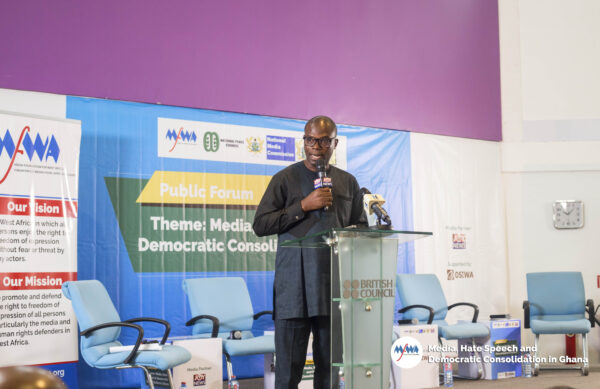
“Our democracy may have endured and withstood the challenges and implications of corruption, bad governance and weak public institutions, but I doubt that our nation may have the capacity to endure yet another threat as serious as the politics of hate speech. But the early signs are very clear, the truth is that we cannot afford to wait for a full-blown hate speech pandemic before we act. We have to admit that our democracy has serious underlining conditions that will make a hate speech pandemic very disastrous. We therefore have to act now.”
Citing statistics, he said in the lead-up to the 2020 elections, MFWA documented as many as 582 incidents of indecent campaign language on radio. These were made up of 313 incidents of insulting and offensive remarks, 202 vitriolic, unsubstantiated allegations and 28 incidents of comments inciting violence.
And according to Mr. Braimah, these numbers were documented from just 100 out of over 530 radio stations in Ghana.
“While these types of expressions may not be necessarily typical hate speech, they constitute potent precursors for hate speech,” he said, adding, “there is no better way to confront the problem of hate speech than through a multi-stakeholder effort.
The Chairman for the forum, Rev. Dr. Adu-Gyamfi, said the forum was timely as the phenomenon of hate speech has recently worsened within public discourse in Ghana. He pointed out that countries like neighbouring Cote d’Ivoire and Kenya were driven into crises in 2010 and 2007 respectively, and Rwanda, experienced a genocide in 1994, due to hate speech.
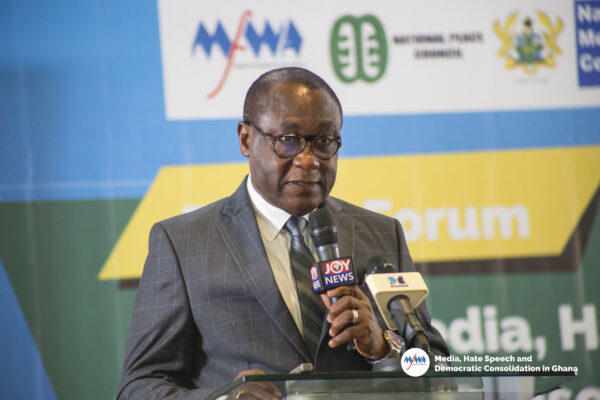
“In Ghana, the problem is not different as the phenomenon of hate speech and indecent expressions has suddenly grown and become a threat to the Ghanaian society. The proliferation of such behaviour is more noticeable during election years. Hate speech and other forms of indecent expressions have been recorded in several other instances in our political space. In some instances, though uncommon, there have been derogatory remarks and insinuations by one ethnic group or tribe against another. These have resulted in some tensions between ethnic and tribal groups that have the potential to disturb the peace of the country.”
The NPC’s partnership with the MFWA and NMC to host the forum, he said was in line with its mandate given it by its establishing Act, 818, to foster peace in the country.
On her part, Deputy Minister of Information, Fatimatu Abubakar, said in a solidarity message that the times, in the 70s and 80s, when information and news could be controlled because there was only one tv station and one radio station, are over. In the current pluralistic media dispensation, she said, no one can control information flow in the media and this puts the onus on people who use media platforms to ensure their language is decent.
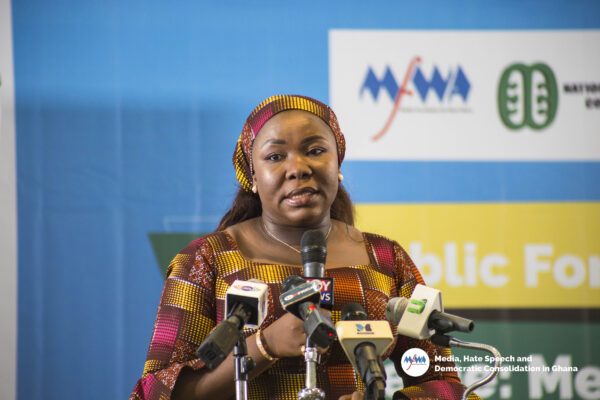
The Konor of Manya Krobor, Nene Sakite ll was of the view that the perpetrators of hate speech are often people who crave societal acceptance. Consequently, even though legislation may be good, it will not be enough if the underlining factors that make people feel excluded in society, and therefore hate, are not addressed.
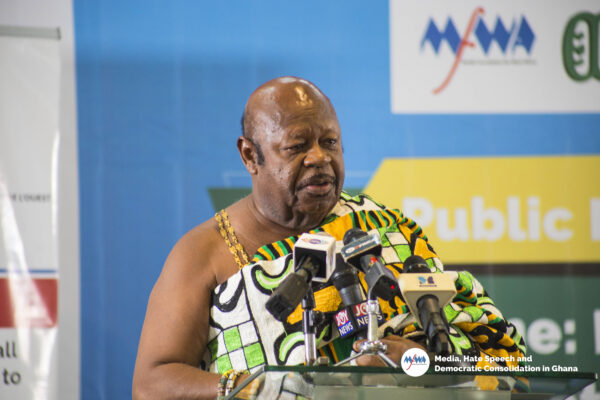
In his keynote address, Mr. Charles Abani concurred that hate speech is dangerous to every society because “it weaponizes differences and divisions, rather than emphasizing similarities, commonalities and things that will bring us together and it is usually characterized by vitriolic contents.”
However, “(its) definition is in dispute because of conflict that appears between the concept of hate speech and the right to express freedom of opinion.”
He, therefore, reemphasized the need for a careful balancing of legislating hate speech, where necessary, with protecting freedom of expression so as to not curtail the latter.
Panel discussion
After the various addresses, a panel of expert stakeholders entered into discussions on the theme of the forum.
The panelists were Mr. Cecil Sunkwa Mills, President of the Ghana Independent Broadcasters Association (GIBA); Lawyer Clara Beeri Kasser-Tee, Vice Chairperson of the Board of Directors of the Center for Democratic Development (CDD) – Ghana; Dr. Festus Aubyn, Regional Coordinator for Research and Capacity Building at the West Africa Network for Peace Building; and Mr. George Sarpong, Executive Secretary of the National Media Commission (NMC).
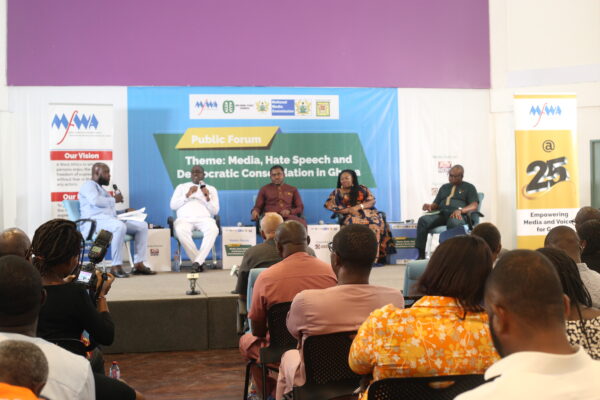
It was the NMC’s position that it has become imperative to make laws against hate speech. In this thinking, the Commission is readying to present proposals to lawmakers for consideration.
Almost a decade ago, the NMC had sought to have such legislation passed but Ghana’s Supreme Court had struck it down as it thought it was dangerous for freedom of expression, especially because at the time, there were no examples for the NMC to cite. However, Mr Sarpong argued that many nations including the US and other democracies in America have since legislated hate speech and this puts the NMC in a good position to make a strong case for legislation.
The Commission sought to assure that legislation would not lead to curtailment on free expression, however, at the end of the deliberations, the consensus was that there was no need to rush it. Rather it was advised that government undertake nationwide consultation so as to rally a national consensus on whether hate speech should be legislated. In the meantime, there was a raft of recommendations that were proposed.
Recommendations
It was advised that emphasis be put more on educating stakeholders of Ghana’s democracy, which is essentially the general public, about the dangerousness of hate speech to the country’s democracy.
The bulk of the recommendations went to the media, but also to political parties, civil society and government.
Media
- Media Owners must invest in training personnel in the art of identifying hate speech and avoiding amplification of same, either by way of hastening to break the news or allowing perpetrators to use their platforms to perpetrate it.
- Media owners must invest in smart technology that helps highlight hate speech so as to prevent the situation where their platforms are used to promote same.
- Media owners should invest in mechanisms that help their media houses to rectify situations where hate speech has been inadvertently put out. Examples are fact-checking tools.
- Journalists must continue to build their capacities and professionalism.
- Journalists and media houses must prioritize accuracy of news over speed.
Government
- Must ensure that state institutions are deliberately capacitated to foster the discredit of hate speech.
- Government must ensure that the concerns and voices of marginalized minority groups are heard.
- Governments must also invest in providing guidelines on public discourse that dissuade hate speech.
- Governments must also deliberately foster national cohesion and peaceful coexistence among the various tribes in Ghana.
Political parties
- Noted to be the worst perpetrators of hate speech, political parties are advised to make efforts to sanitize their language during electioneering campaigns.
- There is the need to move from a winner-takes-all mentality and attitude and foster consensus among citizens.
- The structures of the political parties must make deliberate efforts to ensure that the voices of the minority are not silenced and that where minorities make inputs into politics and governance, the good ones among those suggestions are taken on board.
Citizens groups and civil society
- Must continue to work to ensure that national discourse is devoid of hate speech.
- Must continue to undertake public education campaigns to create sensitisation about hate speech.
- Continue to hold perpetrators of hate speech, especially politicians, to moral account.
The forum was concluded with peace pledges by the media, represented by the Ghana Journalists Association (GJA); religious authorities, led by the Ghana Christian Council (GCC); and political parties, represented by Ghana’s leading opposition party, the National Democratic Congress (NDC).



